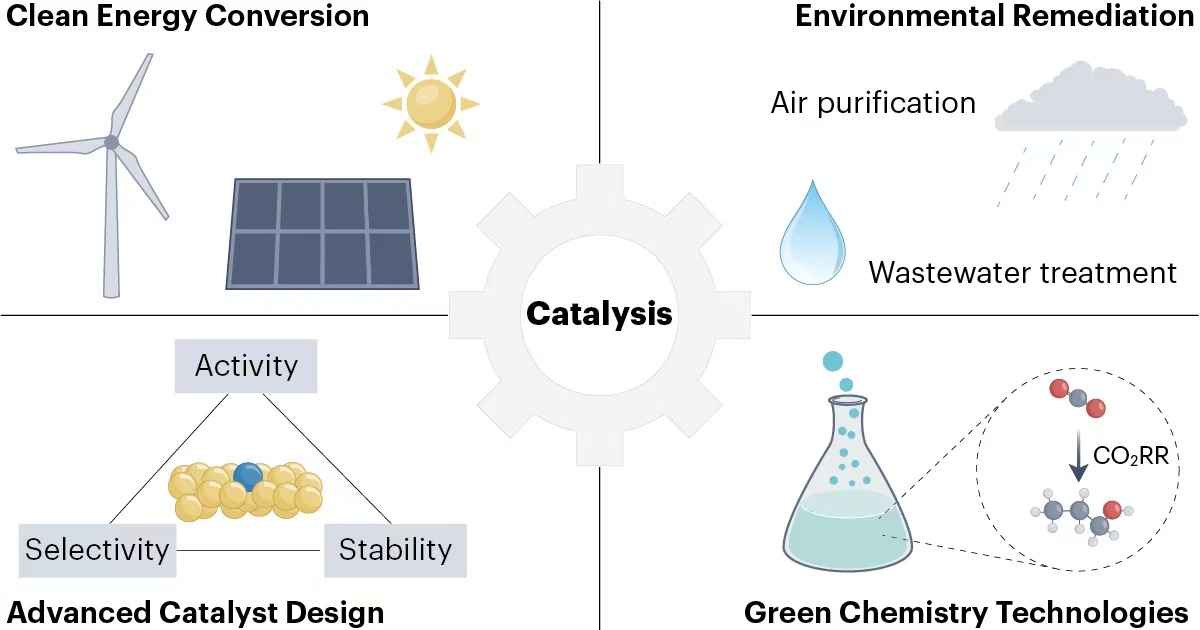Catalysis Accelerating Energy and Environmental Sustainability
A special issue of Catalysts (ISSN 2073-4344). This special issue belongs to the section "Environmental Catalysis".
Deadline for manuscript submissions: 31 December 2025 | Viewed by 22163

Special Issue Editor
Interests: nanozymes; electrocatalytic CO2RR; single-atom catalysts
Special Issues, Collections and Topics in MDPI journals
Special Issue Information
Dear Colleagues,
We are pleased to invite your contributions to this Special Issue, entitled “Catalysis Accelerating Energy and Environmental Sustainability”.
The increasing global demand for clean energy and environmental protection underscores the urgent need for advanced chemical technologies that are capable of addressing the intertwined challenges of climate change and ecological degradation. Catalysis plays a central role in this transition, offering molecular-level control over reaction pathways and enabling efficient, selective, and sustainable chemical transformations under mild conditions. These attributes position catalysis as a cornerstone technology for the development of low-emission, resource-efficient, and environmentally compliant chemical processes.
This Special Issue aims to highlight recent advances in catalysis that contribute to long-term energy and environmental objectives. We welcome contributions ranging from fundamental mechanistic studies and catalyst design to applied innovations that promote green synthesis, sustainable energy conversion, and pollution-free chemical manufacturing. Particular consideration will be given to studies that quantitatively address sustainability metrics, including catalytic efficiency, greenhouse gas mitigation, circular resource utilization, and minimized ecological impact.
In doing so, this Special Issue offers a platform for the catalysis community to rethink its role in an era of rapid global transition. We particularly encourage submissions that transcend conventional disciplinary boundaries, integrate diverse catalytic strategies, or present visionary perspectives on how catalytic innovation can help shape a more resilient and sustainable future.
Topics of interest include, but are not limited to, the following:
Catalytic Systems for Clean Energy Conversion: Exploring electrocatalytic and photocatalytic approaches for water splitting, CO2 reduction to fuels and chemicals, and ambient-condition N₂ fixation. Emphasis is placed on system-level efficiency, product selectivity, and the long-term operational stability of catalysts under realistic working conditions.
Advanced Catalyst Design and Reaction Mechanisms: Development of high-performance catalysts including single-atom catalysts, nanoclusters, and heterostructures, with tailored active sites and tunable electronic structures. We encourage submissions combining in situ/operando spectroscopy, theoretical modeling (e.g., DFT and AIMD), and machine learning to unravel dynamic active-site behavior and mechanistic pathways.
Catalysis for Environmental Remediation: Innovative catalytic solutions for air purification, wastewater treatment, the degradation of persistent organic pollutants, and VOC or CO elimination. Special interest lies in processes operating under mild or solar-assisted conditions, aiming for low-energy, high-efficiency pollution control.
Sustainable Catalyst Fabrication and Green Chemistry Integration: Emphasizing eco-friendly synthesis strategies, including biomass-derived precursors, solvent-free fabrication, and the use of non-precious, earth-abundant elements. We welcome studies on catalysts with enhanced durability, regeneration ability, and scalability for real-world deployment in sustainable chemistry frameworks.
Dr. Jinxing Chen
Guest Editor
Manuscript Submission Information
Manuscripts should be submitted online at www.mdpi.com by registering and logging in to this website. Once you are registered, click here to go to the submission form. Manuscripts can be submitted until the deadline. All submissions that pass pre-check are peer-reviewed. Accepted papers will be published continuously in the journal (as soon as accepted) and will be listed together on the special issue website. Research articles, review articles as well as short communications are invited. For planned papers, a title and short abstract (about 250 words) can be sent to the Editorial Office for assessment.
Submitted manuscripts should not have been published previously, nor be under consideration for publication elsewhere (except conference proceedings papers). All manuscripts are thoroughly refereed through a single-blind peer-review process. A guide for authors and other relevant information for submission of manuscripts is available on the Instructions for Authors page. Catalysts is an international peer-reviewed open access monthly journal published by MDPI.
Please visit the Instructions for Authors page before submitting a manuscript. The Article Processing Charge (APC) for publication in this open access journal is 2200 CHF (Swiss Francs). Submitted papers should be well formatted and use good English. Authors may use MDPI's English editing service prior to publication or during author revisions.
Keywords
- energy conversion
- environmental sustainability
- electrocatalysis
- photocatalysis
- green chemistry
- earth-abundant catalysts
- catalyst durability and regeneration
- low-emission processes
Benefits of Publishing in a Special Issue
- Ease of navigation: Grouping papers by topic helps scholars navigate broad scope journals more efficiently.
- Greater discoverability: Special Issues support the reach and impact of scientific research. Articles in Special Issues are more discoverable and cited more frequently.
- Expansion of research network: Special Issues facilitate connections among authors, fostering scientific collaborations.
- External promotion: Articles in Special Issues are often promoted through the journal's social media, increasing their visibility.
- Reprint: MDPI Books provides the opportunity to republish successful Special Issues in book format, both online and in print.
Further information on MDPI's Special Issue policies can be found here.





